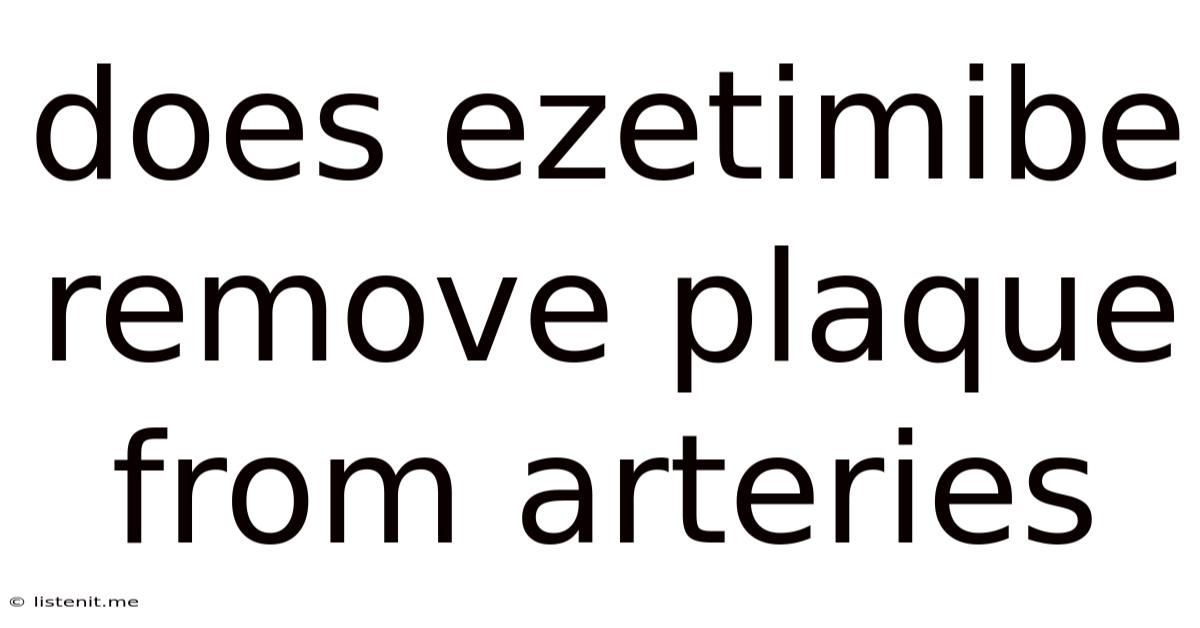Does Ezetimibe Remove Plaque From Arteries
listenit
Jun 13, 2025 · 4 min read

Table of Contents
Does Ezetimibe Remove Plaque from Arteries? Understanding its Role in Cholesterol Management
Heart disease remains a leading cause of death globally, and a significant contributor is the buildup of plaque in the arteries – a condition known as atherosclerosis. This plaque, composed of cholesterol, fats, calcium, and other substances, narrows the arteries, reducing blood flow and increasing the risk of heart attack and stroke. Many seek effective treatments to combat this buildup, and ezetimibe is frequently mentioned. But does ezetimibe actually remove plaque from arteries? The answer is nuanced and requires a deeper understanding of how this medication works.
Ezetimibe: A Cholesterol Absorption Inhibitor
Ezetimibe isn't a miracle cure that dissolves existing arterial plaque. Instead, it works by reducing the absorption of cholesterol from the intestines into the bloodstream. This is a crucial distinction. While it doesn't directly remove plaque, it significantly impacts the supply of cholesterol that contributes to plaque formation and growth.
How Ezetimibe Works
Ezetimibe targets the Niemann-Pick C1-like 1 (NPC1L1) protein located in the small intestine. This protein plays a vital role in cholesterol absorption. By inhibiting NPC1L1, ezetimibe prevents cholesterol from entering the bloodstream, thereby lowering both LDL ("bad") cholesterol and total cholesterol levels.
The Role of Cholesterol in Plaque Formation
Cholesterol, particularly LDL cholesterol, is a key component of arterial plaque. High levels of LDL cholesterol lead to an accumulation of cholesterol in the arterial walls, initiating the inflammatory process that characterizes atherosclerosis. Ezetimibe, by lowering LDL cholesterol, indirectly slows down this process. It reduces the raw material available for plaque growth.
Does Ezetimibe Reverse Atherosclerosis?
While ezetimibe doesn't actively dissolve existing plaque, numerous studies suggest its potential to stabilize existing plaque and potentially slow its progression. This is a crucial point often misunderstood. It's not about removing already formed plaque, but about preventing further buildup and potentially improving the stability of the existing plaque, making it less likely to rupture and cause serious complications.
Clinical Trials and Evidence
Numerous large-scale clinical trials have investigated the effects of ezetimibe on cardiovascular events. These studies have consistently shown a reduction in cardiovascular risk in patients with high cholesterol, demonstrating the medication's efficacy in preventing further cardiovascular problems. However, these studies haven't demonstrated a direct removal of existing plaque, but rather a reduction in the risk of adverse cardiac events.
Combining Ezetimibe with Statins
Ezetimibe is often used in conjunction with statins, another class of cholesterol-lowering drugs. Statins work primarily by inhibiting the production of cholesterol in the liver. Combining ezetimibe with statins provides a synergistic effect, further reducing LDL cholesterol levels and potentially offering more significant cardiovascular protection. This combination therapy is particularly beneficial for patients with very high cholesterol or those who haven't achieved their target LDL cholesterol levels with statins alone.
Beyond Cholesterol: Other Factors in Atherosclerosis
It's crucial to remember that atherosclerosis is a complex process influenced by many factors beyond cholesterol. These include:
- High blood pressure: Elevated blood pressure damages the arterial walls, making them more susceptible to plaque buildup.
- Smoking: Smoking significantly increases the risk of atherosclerosis.
- Diabetes: Diabetes accelerates the process of atherosclerosis.
- Inflammation: Chronic inflammation plays a significant role in the development and progression of atherosclerosis.
- Genetics: Family history of heart disease increases the risk.
- Diet: A diet high in saturated and trans fats contributes to elevated cholesterol levels.
- Lack of exercise: Physical inactivity increases the risk of cardiovascular disease.
Therefore, while ezetimibe plays a crucial role in cholesterol management and consequently atherosclerosis prevention, it's not a sole solution. A comprehensive approach is necessary, addressing all the contributing factors.
Lifestyle Modifications: A Critical Component
Even with medication like ezetimibe, lifestyle modifications are paramount for managing atherosclerosis and reducing cardiovascular risk. These include:
- Diet: Adopting a heart-healthy diet low in saturated and trans fats, cholesterol, and sodium, and rich in fruits, vegetables, and whole grains.
- Exercise: Regular physical activity helps to lower cholesterol, blood pressure, and improve overall cardiovascular health.
- Weight Management: Maintaining a healthy weight reduces stress on the cardiovascular system.
- Smoking Cessation: Quitting smoking is one of the most impactful lifestyle changes for cardiovascular health.
- Stress Management: Chronic stress can negatively impact cardiovascular health. Stress-reducing techniques, such as meditation or yoga, can be beneficial.
The Bottom Line: Ezetimibe and Plaque Removal
To reiterate, ezetimibe does not directly remove plaque from arteries. However, it plays a vital role in lowering cholesterol levels, slowing the progression of atherosclerosis, and reducing the risk of cardiovascular events. It's a valuable tool in managing cholesterol, but it must be part of a holistic approach that includes lifestyle modifications and potentially other medications as advised by a healthcare professional. The focus should be on preventing further plaque buildup and maintaining cardiovascular health through a comprehensive strategy. Regular check-ups with your doctor, including lipid panels and other cardiovascular assessments, are essential for monitoring your progress and making necessary adjustments to your treatment plan. Always consult with your doctor before starting or stopping any medication. This information is for educational purposes only and does not constitute medical advice.
Latest Posts
Latest Posts
-
The Beatings Will Continue Till Morale Improves
Jun 14, 2025
-
I Am Not Your Autumn Moon
Jun 14, 2025
-
Equation Of A Plane Given 3 Points
Jun 14, 2025
-
Voltage Drop In A Series Parallel Circuit
Jun 14, 2025
-
All Time Favorite Of All Time Favorite
Jun 14, 2025
Related Post
Thank you for visiting our website which covers about Does Ezetimibe Remove Plaque From Arteries . We hope the information provided has been useful to you. Feel free to contact us if you have any questions or need further assistance. See you next time and don't miss to bookmark.